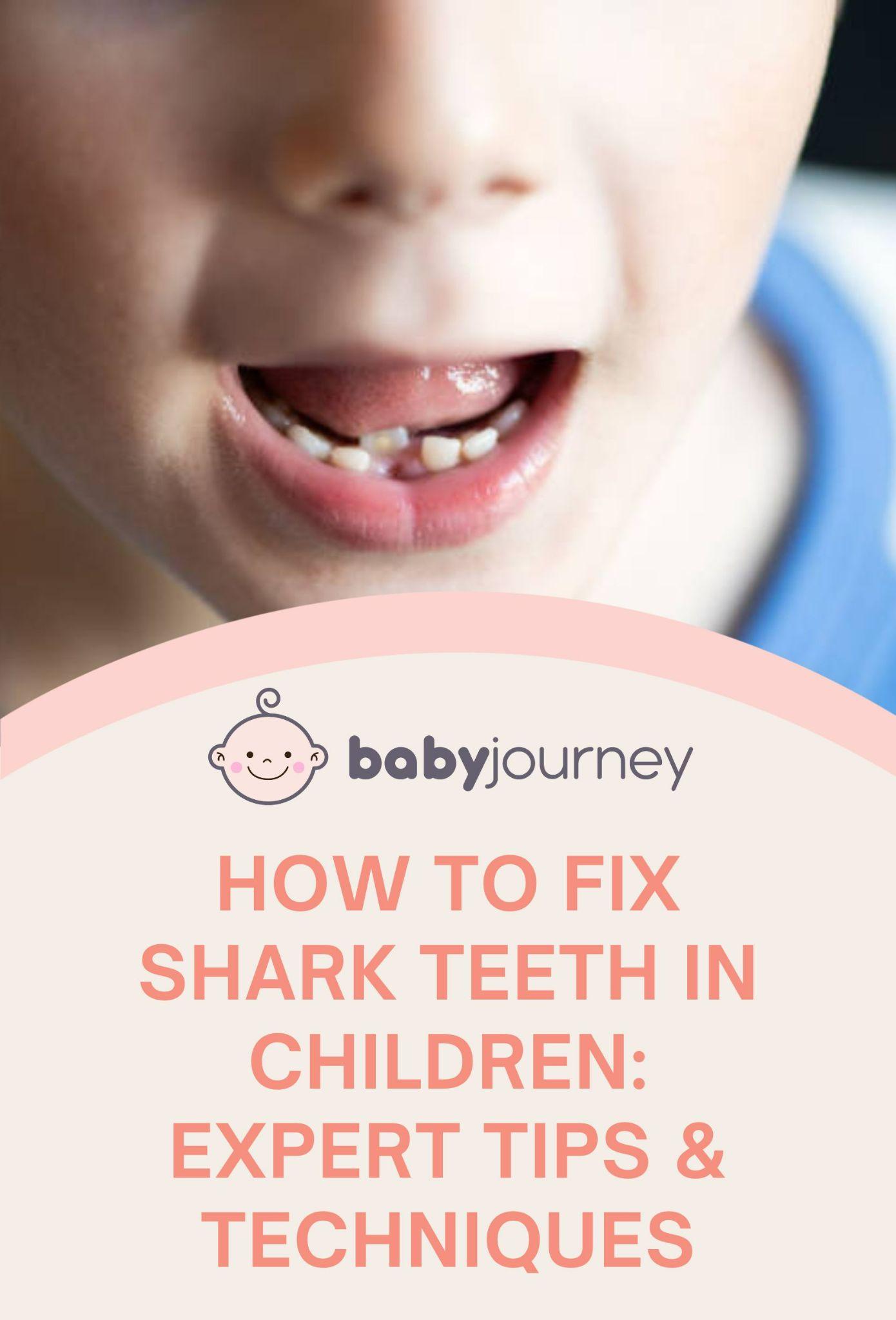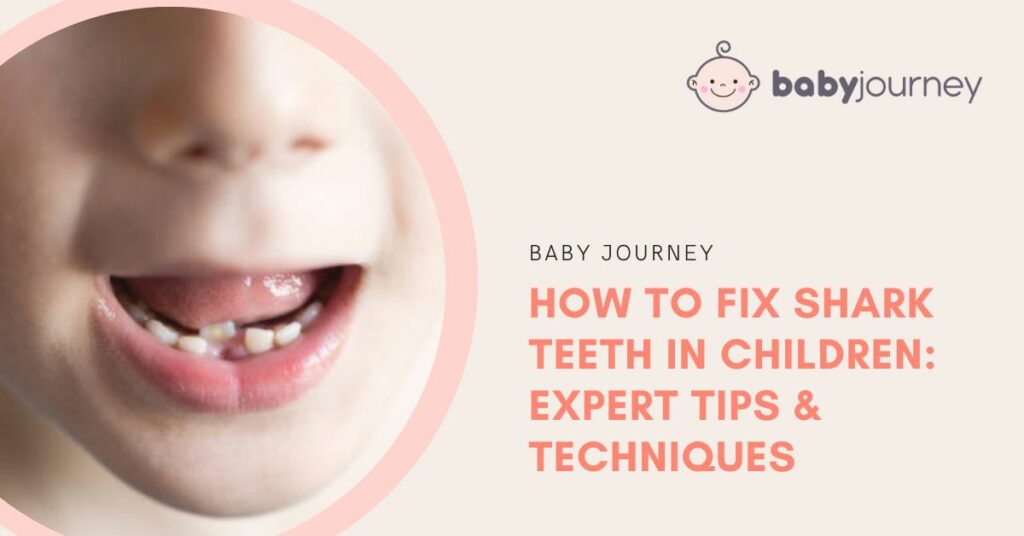Shark teeth, also known as double teeth, occur when a child’s permanent teeth come in behind their baby teeth without pushing them out first. This can cause two rows of teeth to appear, which can be a cause for concern for parents. While it may look alarming, shark teeth are a relatively common occurrence in children. Here are some tips and techniques on how to fix shark teeth in children.
If your child has shark teeth, it’s important to schedule an appointment with a pediatric dentist. During the appointment, the dentist will examine your child’s teeth and determine the best course of action. In some cases, the baby teeth will naturally fall out on their own, but if they do not, the dentist may need to extract them to make room for the permanent teeth to come in properly.
It’s important to address shark teeth as soon as possible to prevent any potential complications. Misaligned shark teeth occur and can cause speech problems, difficulty chewing, and even self-esteem issues for some children. By working with a dentist to fix shark teeth, parents can help their child avoid these issues and ensure they have a healthy, happy smile.
- Understanding Shark Teeth in Children
- Signs and Symptoms of Shark Teeth
- Causes of Shark Teeth
- Diagnosis of Shark Teeth
- Treatment Options for Shark Teeth
- Roles of Pediatric Dentistry
- The Orthodontic Perspective
- Preventive Measures and Dental Care
- Conclusion
- Frequently Asked Questions
- How can shark teeth in children be corrected?
- What are the treatment options for children with shark teeth?
- At what age should a child's shark teeth be evaluated by a dentist?
- Can shark teeth in children be fixed without extraction?
- What are the risks of leaving shark teeth in a child's mouth?
- Is it possible for a child's shark teeth to correct themselves over time?
Understanding Shark Teeth in Children
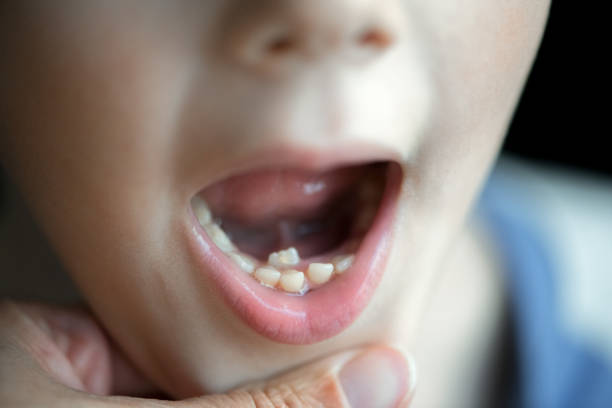
Shark teeth in children occur when their permanent teeth start to come in before the baby teeth have fallen out. This phenomenon results in the child having two rows of teeth, which can cause discomfort and other issues.
The process of losing baby teeth and gaining permanent teeth usually takes place between the ages of 6 and 12. However, in some cases, the permanent teeth can start to grow while the roots of the baby front teeth are still in place. This can lead to the child having a double row of teeth, which can be alarming for parents.
Shark teeth in children can cause discomfort, especially when eating. The double row of teeth can also affect the child’s oral development, leading to misalignment and other issues. It is essential to take the child to a pediatric dentist as soon as possible to address the issue.
Pediatric dentists recommend removing the baby teeth in front of the permanent teeth as soon as possible. If left untreated, larger adult teeth and the permanent teeth can become misaligned, leading to further dental issues down the road. The dentist will evaluate the situation and determine the best course of action for the child’s oral health.
In conclusion, understanding shark teeth in children is crucial for parents to ensure their child’s dental health. If you notice your child has a double row of teeth, take them to a pediatric dentist for evaluation and treatment. Early intervention can prevent further dental issues and ensure your child’s oral development is on track.
Signs and Symptoms of Shark Teeth
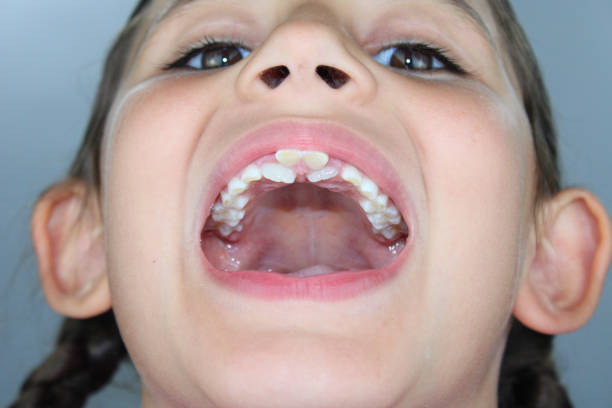
Shark teeth, or double rows of teeth, can be a natural occurrence in children when their permanent teeth start to grow in before their baby teeth have fallen out. While it is not always a cause for concern, there are some signs and symptoms parents should be aware of to ensure their child’s dental health is not compromised.
One of the most common signs of shark teeth is the appearance of a new permanent tooth begins behind a baby tooth that has not yet fallen out. This can cause discomfort and inflammation in the gums, which can lead to pain and discomfort for the child. In some cases, the baby tooth may become loose and fall out on its own, but if it remains in place for too long, it can cause problems for the permanent tooth growing behind it.
Another symptom of shark teeth is inflamed or sore gums around the new tooth. This can be caused by the pressure of the new tooth pushing against the baby tooth or by the baby tooth preventing the new tooth from erupting properly. If left untreated, this inflammation can lead to pain and discomfort for the child and may even require professional treatment.
Parents should also be aware of any pain and inflammation in the area around the shark teeth. This can be a sign of infection or other dental problems and should be addressed by a dental professional as soon as possible. Additionally, if the child is experiencing discomfort or pain when eating or brushing their teeth, it may be a sign that their shark teeth require attention.
In summary, parents should be on the lookout for signs of shark teeth in their children, including the appearance of a new tooth behind a baby tooth, inflamed or sore gums, and pain and inflammation in the area around the shark teeth. If any of these symptoms are present, parents should seek the advice of a dental professional to ensure their child’s dental health is not compromised.
Causes of Shark Teeth
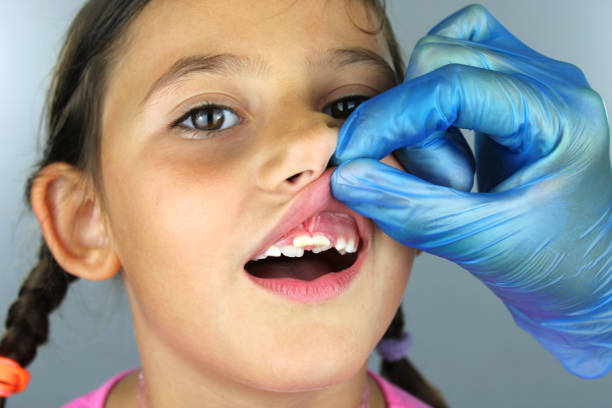
Shark teeth, also known as double row teeth, occur when a child’s permanent teeth erupt behind their primary teeth, resulting in two rows of adult teeth erupt together. This phenomenon is common and can happen to any child. However, there are a few reasons why it can occur.
One of the most common causes of shark teeth is when the permanent tooth starts to grow before the primary tooth has fallen out. This can happen when the primary tooth’s roots are not fully dissolved, and the adult tooth has nowhere to go but behind the primary baby tooth’s root.
Another cause of shark teeth is crowding. When there is not enough space in the mouth for the permanent teeth to grow, they may erupt behind the primary teeth. This can also happen when the permanent teeth are larger than the primary teeth, and there is not enough space for them to grow.
Also read: Why is My Baby Grinding Teeth
Ectopic eruption is another cause of shark teeth. This occurs when the permanent tooth grows in an abnormal position and the permanent tooth erupts from behind the primary tooth. This can happen due to genetics or other factors that affect the development of the teeth.
It is important to note that shark teeth are not a sign of poor dental hygiene or a dental problem. It is a natural occurrence that can happen to any child. However, it is essential to consult a pediatric dentist if the child’s shark teeth cause discomfort, pain, or affect their ability to eat or speak properly.
Diagnosis of Shark Teeth
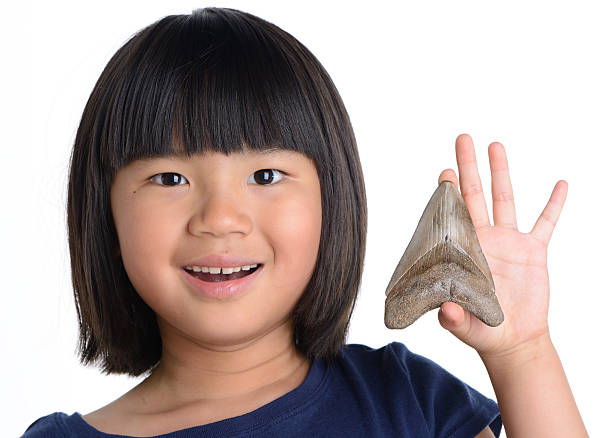
When a child develops shark teeth, it is important to diagnose the condition as soon as possible to avoid any potential complications. A dentist or pediatric dentist can perform a visual exam to determine if the child has shark teeth. During the exam, the dentist will look for any signs of permanent teeth growing behind or in front of baby teeth.
In some cases, an x-ray may be necessary to determine the exact position of the permanent teeth. This is especially true if the baby teeth are not loose or if there is a concern that the permanent teeth may be affecting the development of other teeth.
If a child is diagnosed with shark teeth, the dentist may recommend an appointment to monitor the situation. In some cases, the baby teeth may fall out on their own, but in other cases, the dentist may need to extract the baby teeth to allow the permanent teeth to grow in properly.
Overall, the diagnosis of shark teeth is relatively straightforward and can be done with a simple visual exam or x-ray. It is important to seek the advice of a dentist or pediatric dentist if you suspect your child has shark teeth to ensure proper treatment and avoid any potential complications.
Treatment Options for Shark Teeth
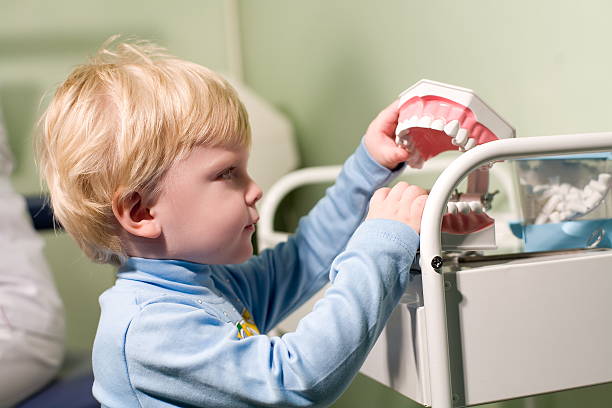
When a child develops shark teeth, treatment options may vary depending on the severity of the situation. In most cases, the stubborn baby tooth or teeth will eventually fall off, and the adult teeth will naturally take their place. However, if the baby tooth is not loose, but there’s a new tooth behind or in front of it, it’s time to see the dentist.
The first step in treating shark teeth is to schedule a wiggle appointment with a pediatric dentist. During this appointment, the dentist will evaluate the situation and determine the best course of action. In some cases, the baby shark tooth may need to be extracted to make way for the permanent tooth.
Tooth extraction is a common treatment option for shark teeth. The procedure is quick and relatively painless, and it allows the permanent tooth to come in properly. Over-the-counter pain medications may be recommended to manage any discomfort after the procedure.
If the permanent teeth continue to erupt behind the baby teeth so that they’re almost as tall as the baby teeth with only limited mobility, extractions in the office may be recommended. In some cases, a gum graft may be necessary to help support the new permanent one behind the baby tooth.
Overall, the treatment options for shark teeth depend on the individual situation. To choose the best course of action, it is crucial to speak with a pediatric dentist. They can provide expert guidance and support throughout the process to ensure the best possible outcome for the child.
Roles of Pediatric Dentistry
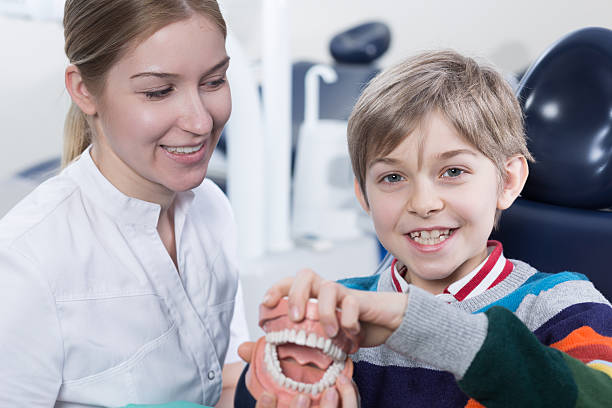
Pediatric dentistry is essential for maintaining children’s dental health, particularly the identification and management of shark teeth. An expert dentist who has undergone further training to treat children’s teeth, from young infants to teenagers, is known as a pediatric dentist.
Pediatric dentists are equipped to handle the unique challenges that come with treating children, such as their smaller mouths and developing teeth. They also have experience in dealing with behavioral issues that may arise during dental visits.
When it comes to shark teeth, pediatric dentists can provide specialized care to ensure that the child’s dental health is not compromised. They can determine the best course of action, whether it involves removing the baby called shark teeth, or monitoring the situation to see if the teeth will naturally fall out.
It is important for parents to take their child to a pediatric dentist as soon as possible if they notice any signs of shark teeth. Early intervention can prevent complications and ensure that the child’s permanent teeth come in correctly.
In addition to treating shark teeth, pediatric dentists can provide preventive care to promote good oral health. This includes regular check-ups, cleanings, and fluoride treatments. They can also educate parents and children on proper oral hygiene habits, such as brushing and flossing.
Overall, pediatric dentistry plays a crucial role in ensuring that children maintain good oral health and receive the specialized care they need. Parents should prioritize regular dental visits for their children to prevent and address any dental issues, including shark teeth.
The Orthodontic Perspective
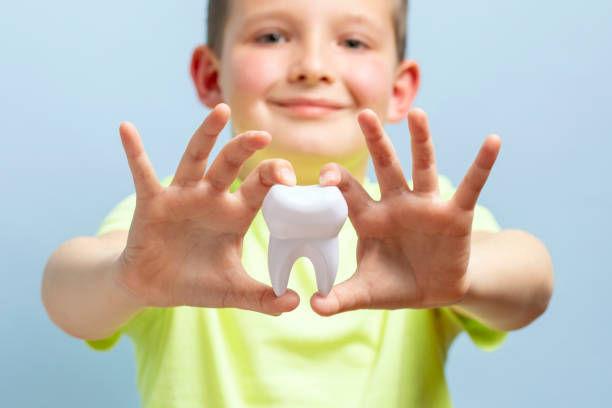
When it comes to fixing shark teeth in children, orthodontists are the specialists to turn to. An orthodontist is a dental professional who specializes in the diagnosis, prevention, and treatment of dental and facial irregularities. They have the expertise and experience to handle a wide range of dental issues, including how to fix shark teeth in child.
The first thing to do if a youngster has shark teeth is to set up an orthodontic consultation. The orthodontist will assess the child’s teeth and jaws during the consultation to decide the best course of action. To develop a unique treatment plan, they will also take X-rays, pictures, and impressions of the child’s teeth.
One common issue that can lead to shark teeth is crowding. Crowding occurs when there is not enough room in the child’s mouth for all of their teeth to come in properly. This can cause the permanent teeth to come in behind the baby teeth, resulting in shark teeth. Orthodontic treatment can help correct crowding issues by creating more space in the child’s mouth for their teeth to come in properly.
Another issue that can lead to shark teeth is when the permanent teeth in the back molars come in before the baby teeth in front of them have fallen out. This can cause the permanent teeth to come in behind the baby teeth, resulting in shark teeth. In this case, the orthodontist may recommend a space maintainer to hold the space for the permanent teeth until the baby teeth fall out.
In some cases, the upper back molars may also cause shark with lower permanent teeth. If the upper back molars come in before the lower front teeth, they can push the lower front teeth forward, causing them to overlap. Orthodontic treatment can help correct this issue by moving the upper back molars back into their proper position.
Overall, if a child has shark teeth, it is important to seek the advice of an orthodontist. With the right treatment plan, an orthodontist can help correct the issue and ensure that the child’s teeth come in properly.
Preventive Measures and Dental Care
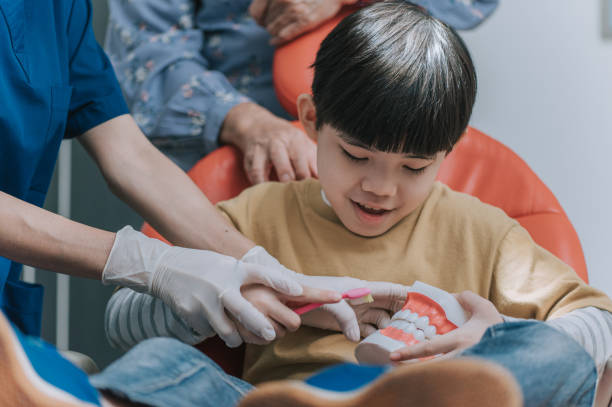
Prevention is key when it comes to shark teeth in children. Regular dental care and check-ups can help detect any potential issues early on, preventing complications in the future. Here are some preventive measures and dental care tips to keep in mind:
- Start dental care early: Even before the first tooth erupts, it’s critical to begin dental care. After feedings, parents should wipe their baby’s gums with a soft, wet towel to get rid of any bacteria that could lead to tooth rot.
- Schedule an appointment: Parents should schedule their child’s first dental appointment by their first birthday or within six months of their first tooth appearing. Regular dental check-ups every six months can help detect any issues early on.
- Brush and floss regularly: Brushing and flossing regularly can help prevent tooth decay and gum disease. Parents should brush their child’s teeth twice a day with fluoride toothpaste and floss once a day.
- Limit sugary foods and drinks: Sugary foods and drinks can increase the risk of tooth decay. Parents should limit their child’s consumption of sugary foods and drinks, and encourage them to drink plenty of water.
- Use mouthguards: Mouthguards can help prevent dental injuries during sports and other physical activities.
- Be aware of orthodontic issues: Parents should be aware of any orthodontic issues and have their child evaluated by an orthodontist if necessary. Early intervention can help prevent more serious issues in the future.
Overall, good dental care and preventive measures can go a long way in maintaining good oral health and preventing shark teeth in children. By starting early and staying consistent, parents can ensure their child’s teeth stay healthy and strong.
Conclusion
Shark teeth can be a common occurrence in children, but it is important to address them promptly to avoid any complications. As discussed, shark teeth happen when a child’s permanent teeth come in before their baby teeth have fallen out. This can cause the permanent teeth to come in behind, in front of, or even next to the baby teeth, resulting in two rows of teeth.
If your child has shark teeth, it is important to consult with a pediatric dentist. They are able to assess the circumstance and choose the best course of action. In some cases, the baby teeth may need to be extracted to allow the permanent teeth to come in correctly.
It is important to note that not all cases of shark teeth require intervention. If the baby teeth are loose and the permanent teeth are coming in correctly, then the baby shark teeth resolve and may fall out on their own. However, if the baby teeth are not loose and the permanent teeth are coming in incorrectly, then it is important to seek treatment.
Parents can also take steps to prevent shark teeth by maintaining good oral hygiene habits in their children. This includes brushing twice a day, flossing daily, and visiting the dentist regularly. By doing so, parents can help ensure that their children’s teeth come in correctly and avoid any potential complications.
In conclusion, shark teeth can be a common occurrence in children, but they can be addressed with prompt treatment and good oral hygiene habits. If your child has shark teeth, be sure to consult with a pediatric dentist to determine the best course of action. By taking a proactive approach to oral health, parents can help ensure that their children’s teeth come in correctly and avoid any potential complications.
Frequently Asked Questions
How can shark teeth in children be corrected?
Shark teeth in children can be corrected through a dental procedure called extraction. This involves removing the baby tooth that is blocking the permanent tooth from coming in properly. In some cases, the permanent tooth may need to be guided into the correct position with the baby tooth starting the help of braces or other orthodontic appliances.
What are the treatment options for children with shark teeth?
The most common treatment option for children with shark teeth is extraction. However, the specific treatment plan will depend on the individual child’s situation. In some cases, orthodontic treatment may be necessary to guide the permanent tooth into the correct position.
At what age should a child’s shark teeth be evaluated by a dentist?
Children’s shark teeth should be evaluated by a dentist as soon as they are noticed. The American Academy of Pediatric Dentistry recommends that children have their first dental visit by their first birthday. This allows the dentist to identify any potential issues early on and develop an appropriate treatment plan.
Can shark teeth in children be fixed without extraction?
In most cases, shark teeth in children cannot be fixed without extraction of permanent adult teeth. However, in some cases, the permanent tooth may be able to come in on its own once the baby tooth falls out. This is more likely to happen if the baby tooth is loose and close to falling out naturally.
What are the risks of leaving shark teeth in a child’s mouth?
Leaving shark teeth in a child’s mouth can lead to several issues. The permanent tooth may come in at an angle or in the wrong position, which can cause crowding and other orthodontic problems. Additionally, the baby tooth may not fall out on its own, which can lead to infection or other complications.
Is it possible for a child’s shark teeth to correct themselves over time?
In some cases, a child’s shark teeth may correct themselves over time. This is more likely to happen if the child’s baby teeth or tooth is loose and close to falling out naturally. However, if the baby tooth is not loose or is not falling out on its own, extraction may be necessary to prevent further complications.
